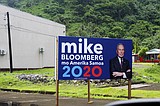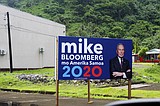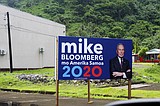Samoa airline introduces pay-by-weight pricing
Fili Sagapolutele | Hagadone News Network | UPDATED 12 years, 10 months AGO
PAGO PAGO, American Samoa - A tiny Samoa airline is offering a new reason to drop extra weight before your next trip: Tickets sold not by the seat, but by the kilogram.
Samoa Air planned today to start pricing its first international flights based on the weight of its passengers and their bags. Depending on the flight, each kilogram (2.2 pounds) costs 93 cents to $1.06.
That means the average American man weighing 195 pounds with a 35 pound bag would pay $97 to go one-way between Apia, Samoa, and Pago Pago, American Samoa. Competitors typically charge $130 to $140 roundtrip for similar routes.
The weight-based pricing is not new to the airline, which launched in June. It has been using the pricing model since November, but in January the U.S. Department of Transportation approved its international route between American Samoa and Samoa.
The airline's chief executive, Chris Langton, said Tuesday that "planes are run by weight and not by seat, and travelers should be educated on this important issue. The plane can only carry a certain amount of weight and that weight needs to be paid. There is no other way."
Langton, a pilot himself, said when he flew for other airlines, he brought up the idea to his bosses to charge by weight, but they considered weight as too sensitive an issue to address.
"It's always been the fairest way, but the industry has been trying to pack square pegs into round holes for many years," he said.
Travelers in the region already are weighed before they fly because the planes used between the islands are small, said David Vaeafe, executive director of the American Samoa Visitors Bureau. Samoa Air's fleet includes two nine-passenger planes for commercial routes and a three-passenger plane for an air taxi service.
Langton said passengers who need more room will be given one row on the plane to ensure comfort.
The new pricing system would make Samoa Air the first to charge strictly by weight, a change that Vaeafe said is, "in many ways... a fair concept for passengers."
"For example, a 12- or 13-year-old passenger, who is small in size and weight, won't have to pay an adult fare, based on airline fares that anyone 12 years and older does pay the adult fare," he said.
Vaeafe said the pricing system has worked in Samoa but it's not clear whether it will be embraced by travelers in the U.S. territory.
Langton said the airline has received mixed responses from overseas travelers since it began promoting the pricing on its website and Facebook page.
Langton said some passengers have been surprised, but no one has refused to be weighed yet. He said he's given away a few free flights to some regular customers who lost weight, and that health officials in American Samoa were among the first to contact the airline when the pricing structure was announced.
"They want to ride on the awareness this is raising and use it as a medium to address obesity issues," he said.
Islands in the Pacific have the highest rates of obesity in the world. According to a 2011 report by the World Health Organization, 86 percent of Samoans were overweight, the fourth worst among all nations. Only Samoa's Pacific neighbors Nauru, the Cook Islands and Tonga ranked worse.
In comparison, the same study found that 69 percent of Americans were overweight, 61 percent of Australians, and 22 percent of Japanese. Samoa ranked just as poorly in statistics measuring those who were obese, or severely overweight.
Ana Faapouli, an American Samoa resident who frequently travels to Samoa, said the pricing scheme will likely be profitable for Samoa Air.
"Samoa Air is smart enough to find ways to benefit from this service as they will be competing against two other airlines," Faapouli said.
Pago Pago-based Inter Island Airways and Polynesian Airlines, which is owned by the Samoa government, also run flights between the country and American Samoa.
ARTICLES BY FILI SAGAPOLUTELE

Bloomberg's hope for Super Tuesday splash lands in Pacific
PAGO PAGO, American Samoa (AP) — What does more than $500 million get you? For Mike Bloomberg, it was 175 winning votes in this U.S. territory — a group of Pacific islands with lush vegetation and stunning coastlines some 7,200 miles (11,600 kilometers) from where he once served as New York City's mayor.

Bloomberg's hope for Super Tuesday splash lands in Pacific
PAGO PAGO, American Samoa (AP) — What does more than $500 million get you? For Mike Bloomberg, it was 175 winning votes in this U.S. territory — a group of Pacific islands with lush vegetation and stunning coastlines some 7,200 miles (11,600 kilometers) from where he once served as New York City's mayor.

Bloomberg's hope for Super Tuesday splash lands in Pacific
PAGO PAGO, American Samoa (AP) — What does more than $500 million get you? For Mike Bloomberg, it was 175 winning votes in this U.S. territory — a group of Pacific islands with lush vegetation and stunning coastlines some 7,200 miles from where he once served as New York City's mayor.
